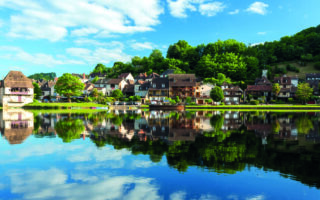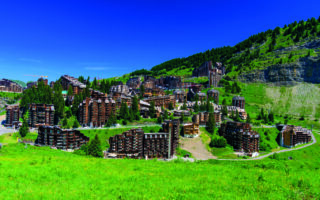What and Where to Buy in Brittany

Brittany is a large region. Here’s our guide to the properties and the important things to consider before making an investment.
Areas of Brittany
We’ve gathered some insight into the area from some local estate agents:
Colin, our French Entrée estate partner in Côte d’Armor, describes his adopted home. “Brittany has many faces, from the rugged coast with its long sandy beaches (where properties with sea views still command a high price and sell quickly) to the empty roads and wooded interior, still offering the best value for money. There is a wealth of property for sale.”
Patrick, in Carhaix, also notes that, “the centre of Brittany remains very attractive in terms of properties available, compared to the coast”
Veerle in Dinan, agrees that the centre of the region offers a huge range of stunning old properties at comparatively very low prices. However, she still recommends the more expensive towns and coast for value, “properties in the interior countryside do not resell very easily, and they are more difficult to rent out as holiday accommodation.”

As a rule of thumb you’ll find thatched stone houses mainly in Finistère and some in Morbihan; go to Cotes d’Armor and Ille et Vilaine for stone walls with a slate roof; thatch with wattle and daub can be found dotted all around Brittany and timber-framed properties are concentrated in the medieval town centres. The stone used for building varies according to very localised geology, from blocks to flat stones, and from grey to honey-coloured (south of Dinan) to a reddish colour (e.g. Combourg in Ille et Vilaine).
Important Things To Consider
The first question is whether you want a holiday home or a permanent residence, as this will have considerable bearing on the area and type of property you choose. Do you want nature and wildlife or shops and nightlife? How are your French language skills? A rural hamlet might make you feel isolated in the beginning, until you can feel confident to communicate in French. Do you want to be able to walk to the village shops or are you don’t mind jumping in the car?
Permanent residence:
If you feel ready to take the plunge and search for your dream home, remember you are not just buying a house, you are buying a lifestyle – beautiful countryside with low population density, lack of pollution, a pleasant climate with summer temperatures above those in the UK, good food and wine, good health and education systems, less stress generally and, as Colin says, “one outstanding thing about living here is the friendliness of the local Breton people”.

A large number of buyers are aged between 50 and 60. If you are in this group, you should plan ahead for your requirements in 15 or 20 years’ time. How far away are the shops, which villages have a general store, a post office, a bar/tabac, a hairdresser? Where’s the nearest doctor and dentist? Think about your mobility and ease of maintenance of the property. Veerle has noticed that a proportion of residents will leave after five or ten years, mainly due to missing grandchildren growing up, or the language barrier or the loss of a partner. A number of Brittany residents who would have liked to return, found that they couldn’t afford equivalent property (or lifestyle) in the UK where property is still significantly more expensive than in Brittany.
But not everyone moves to Brittany to retire, younger families are also tempted by the lifestyle. Finding employment is the main barrier for families hoping to make a living in France. A good knowledge of French is advised to look for employment and some British qualifications are not recognised by the French system – nurses and teachers for example. You may need to take further exams or concours in French if you want to pursue such professions. Self-employment is an option and it has become relatively simpler to set up a small business in France under the autoentrepreneur program. If you can afford it, buying an established business could be a possibility, too. If you are looking to renovate an old property with outbuildings to convert to gites or chambres d’hôtes it pays to carefully research the market to make sure that the demand will be there. Location is always a key factor but if you are looking to appeal to the competitive tourist trade a special location or unique feature becomes critical to make your offer stand out form the rest.

If regular visits to the theatre, shops or art exhibitions are an important part of your lifestyle, make sure you are near one of the larger towns, like the capital of Brittany, Rennes. Being near a big town also means that you can easily take the train to Paris, or a flight to the UK.
Finally, as Colin points out, “Permanent homes are still good value for money as annual costs are less than in the UK, but it needs to be remembered that although purchasing prices are less, renovation costs are the same, if not slightly higher than in Britain.”
So, do your research before uprooting your life and make sure you consider your budget carefully.
Holiday home:

If you are just popping over for a few weekends a year to recharge your batteries, you may want to stay close to the airport in Lorient, Rennes, Dinard or Brest.
If you are buying a holiday home, then you don’t need to consider rentability, which makes you choice wider. However, you may want to think about how to maintain your potential property and land. Will you be available to look after it or do you need somewhere that can be left untouched for lengths of time, without you having to spend your whole holiday on DIY and gardening?
Colin reminds us that, “The cost of maintaining a holiday home in France is not enormous but need to be worked into the budget. A small cottage will cost about €1000 a year in insurance and standing charges for the services.”
In terms of the market in general, Patrick says, “The majority of houses we sell are second homes”.
Buy-to-let:
If you are considering buying a property to let it out during the season it is best to find a property that has something special, such as a large town or coastal location, to make it attractive to visitors.
A long-term rental is another option. Colin comments, “As French people are accustomed to renting, buy-to-let is a good option, but much depends on location. The French, as a general trend, prefer to live close to their work and the shops. Also, long-term rentals are usually for three years and rental rates vary.”
Veerle says that she has only seen one or two Brits in the whole history of the agency that have bought a traditional buy-to-let, although it is common in the French community to do so. “There are lots of tax benefits for French people to do up a place and rent it out permanently – not so much for non-French residents!”
Land – something else to consider:

One of the most common mistakes that Brits make with property in France, is buying somewhere with too much land. It is tempting to fall for the large garden or meadow or two at very little extra cost. Be realistic and think about how you will you cope with keeping the weeds down and the hedges trimmed, mowing fields or managing woodland. If you plan to pay someone else to do it just remember to work that annual cost into the budget.
It’s deceptive to apply a one-size-fits-all rule. While Veerle has noticed that people are increasingly buying in towns and are not too concerned about having much land, Colin, has seen a rise in clients looking for properties which can accommodate horses – he thinks that this is due to cost of grazing land and livery the UK. The choices are there for you decide.
Browse properties for sale in Brittany >>>
For further information or for help with your property search, please call our property team +44 (0)1225 463 752 or email propertysales@frenchentree.com
•With thanks to French Entrée Brittany estate partners Colin, Patrick, Veerle and Gemma Driver.
Share to: Facebook Twitter LinkedIn Email
More in beach, brittany, businesses, estate agents, guides, insurance, summer
Leave a reply
Your email address will not be published. Required fields are marked *



